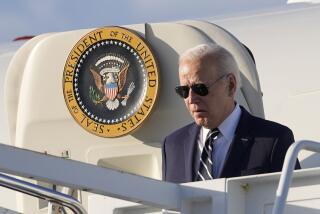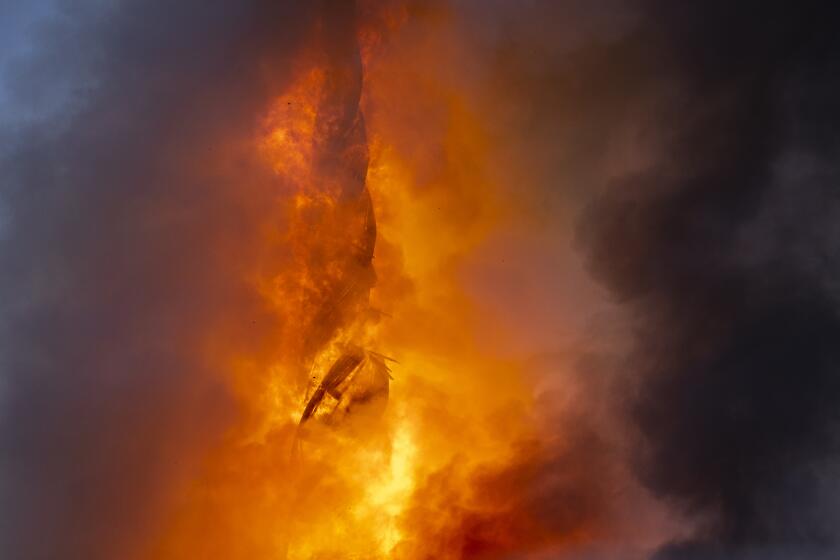U.S. willing to act alone on Syria attack
WASHINGTON — The White House signaled that the United States would act alone in Syria if necessary to protect its national security interests, as a Western coalition that just days ago appeared determined to launch a joint military action split wide open.
President Obama appeared increasingly isolated after British Prime Minister David Cameron lost a vote Thursday in the House of Commons on endorsing military action. It was a stunning defeat for a government that days ago called for punishing Syrian President Bashar Assad’s forces for alleged use of chemical weapons against rebel-held neighborhoods last week.
Britain “will not be involved” in any military strikes on Syria, Defense Secretary Philip Hammond said after the vote. However, he added, “I don’t expect that the lack of British participation will stop any action.”
Obama administration officials made their case for armed intervention in a conference call with congressional leaders Thursday night.
“As we’ve said, President Obama’s decision-making will be guided by what is in the best interests of the United States,” said Caitlin Hayden, spokeswoman for the National Security Council. “He believes that there are core interests at stake for the United States and that countries who violate international norms regarding chemical weapons need to be held accountable.”
As the Pentagon moved a fifth destroyer armed with cruise missiles into the eastern Mediterranean for possible action against Syria, other major allies also appeared to pull back.
French President Francois Hollande, whose government was the first Western advocate for a military response, and German Chancellor Angela Merkel, who also had offered support, called for delaying any military operation until the United Nations Security Council can review evidence collected by chemical weapons experts now in Syria.
The 20-member team is scheduled to leave Damascus, the Syrian capital, by Saturday, but its final report may be days or weeks away. The team will try to determine whether sarin nerve gas or other toxic chemical agents were used, but not who used them.
In a TV interview Wednesday, Obama said the American security interest in Syria included deterring further use of chemical weapons, stopping terrorists from obtaining such weapons, and protecting nearby allies such as Israel and Turkey as well as U.S. military bases in the region.
Administration officials said Obama had no interest in getting bogged down at the U.N., especially since Russia almost certainly would block any resolution condemning Syria, a close ally. China also would be likely to object.
“We will make our own decisions, with our own timelines,” said Marie Harf, a State Department spokeswoman. She said the administration had not decided what course it would take.
Josh Earnest, a deputy White House spokesman, said Obama was interested in engaging with the international community as he considered whether to order punitive missile strikes. “We want to continue to keep our allies in the loop as the president considers a decision about a response,” he said.
The fracturing of the coalition was driven in part by growing questions about the intelligence the White House has cited but has yet to make public. At the heart of the objections are worries about a repeat of the 2003 invasion of Iraq, when the United States talked allies into joining a foreign intervention based on faulty intelligence.
“It didn’t take long for the ghosts of Iraq to reappear,” said Joel Rubin, a former State Department official now with the Ploughshares Fund, an arms control advocacy group in Washington. “It looks now like they’re really bogging everything down.”
Harf denied that the Obama administration was hyping the intelligence. She would not discuss the evidence, but rejected the Iraq analogy.
“In Iraq, the U.S. was trying to prove the existence of weapons of mass destruction,” she said. “In Syria, we know that chemical weapons not only exist but … that they were used on Aug. 21. So that’s not in question. That’s undeniable.”
Western intelligence agencies appear to have compiled only a circumstantial case — not proof — that Assad or his commanders authorized use of poison gas.
In London, the Joint Intelligence Committee released a letter early Thursday concluding that it was “highly likely” that Assad’s government was responsible, citing “a limited but growing body of intelligence.”
U.S. intelligence is similarly guarded. There is no proof that Assad — rather than a lower-level or rogue commander — was directly involved, or that the attack wasn’t a cynical attempt by opposition forces to draw the West into Syria’s civil war, now in its third year.
The U.S. government does not know whether Assad personally approved the attacks or what he was told about them, officials said. After reviewing the intelligence, Sen. Dianne Feinstein (D-Calif.), who heads the Senate Intelligence Committee, said the evidence “points to” Assad’s involvement. She stopped well short of calling it definitive.
Members of Congress from both parties, who are on a monthlong recess that ends Sept. 9, also stepped up their calls for the White House to consult them more fully and perhaps bring the issue to a vote.
Obama spoke by phone to Sen. Mitch McConnell (R-Ky.), the minority leader, and House Speaker John A. Boehner (R-Ohio).
Boehner urged the president to provide Congress and the public with a “legal justification for any military strike, the policy and precedent such a response would set, and the objectives and strategy for any potential action,” said Brendan Buck, Boehner’s spokesman.
Sen. Robert Menendez (D-N.J.), chairman of the Senate Foreign Relations Committee, offered strong backing for Obama after the intelligence briefing.
“Tonight’s briefing reaffirmed for me that a decisive and consequential U.S. response is justified and warranted to protect Syrians, as well as to send a global message that chemical weapons attacks in violation of international law will not stand,” he said.
“My worry is that cruise missile strikes and arming the Syrian rebels are going to make the situation worse, not better,” Sen. Chris Murphy (D-Conn.) said in a tweet.
The White House would face an uphill battle winning congressional approval for military action if conservative Republicans and liberal Democrats joined in opposition. Already more than 160 House members have signed letters circulated by Republicans and Democrats seeking a vote.
“My guess is a clear majority of the House is of that opinion,” Rep. Zoe Lofgren (D-San Jose) said on CNBC.
Richter and Parsons reported from Washington and Chu from London. Times staff writers Ken Dilanian, Shashank Bengali, David S. Cloud, Michael A. Memoli, Lisa Mascaro and Kathleen Hennessey in Washington contributed to this report.
More to Read
Start your day right
Sign up for Essential California for news, features and recommendations from the L.A. Times and beyond in your inbox six days a week.
You may occasionally receive promotional content from the Los Angeles Times.









